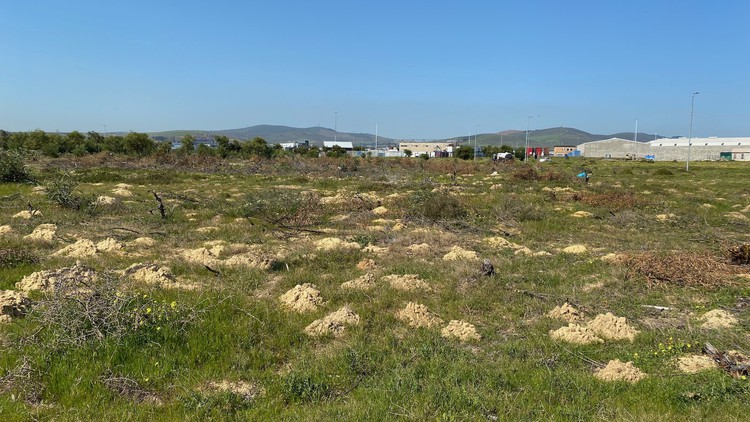Developers try to overturn sale of land for Cape Town housing development
Covid-19 triggered a plan to move families from overcrowded Dunoon informal settlements, but more than a year later, they’re still there
The Racing Park Developers’ Association wants to overturn the sale of industrial land to the Western Cape Human Settlements Department for housing 1,500 families from overcrowded informal settlements in Dunoon. Photo: Peter Luhanga
- The Racing Park Developers’ Association wants to overturn the sale of industrial land to the Western Cape Human Settlements Department.
- The association has already unsuccessfully appealed against the rezoning of the land for mixed-use housing of 1,500 families from overcrowded informal settlements in Dunoon.
- Then-Minister of Human Settlements minister Lindiwe Sisulu promised in April 2020 that the families would be moved to fight the spread of Covid-19.
- But the move has not taken place.
- The developers’ association says their member who signed off the sale was not authorised to do so.
A developers’ association is trying to block the use of part of Milnerton’s Racing Park industrial area in Cape Town for mixed housing.
The Racing Park Developers’ Association unsuccessfully challenged applications to rezone part of the area to accommodate a mixed-use housing development. Now the association is taking the developer who sold the land to the Western Cape government to court.
The association claims that the developer, who is a member of the association, did not have authority to sign transfer documents for the land on its behalf.
Association chair Renzo Schincariol says the case is currently with lawyers. According to Western Cape Human Settlements spokesperson Muneera Allie, her department paid about R65 million for the land. But Schincariol says the sale was “illegal, irregular”.
On 6 April 2020 then-Minister of Human Settlements minister Lindiwe Sisulu announced that families living in overcrowded conditions in Dunoon and Kosovo would be moved to slow the spread of Covid-19. Sisulu stated they would be relocated to the industrial park by July 2020.
To date, no one has been moved.
In April this year, provincial human settlements department spokesperson Nathan Adriaanse said the department had submitted two rezoning applications for the land in line with municipal planning by-laws: one for the rezoning of 3.4 hectares of industrial land, in May 2020, and one for the rezoning of 6.1 hectares of agricultural land, in June 2020.
The Racing Park Developers’ Association appealed against both applications, but was unsuccessful. City of Cape Town Mayco Member for Spatial Planning and Environment, Marian Nieuwoudt, said the rezonings were approved by the City of Cape Town appeals authority in June and July this year, subject to conditions.
The conditions relate to stormwater management and the capacity of the Potsdam Waste Water Treatment Works to accommodate the development. Allie said the project team was “aligning various technical specifications in order to respond to the conditions of approval before construction can commence”. The department had engaged with the City of Cape Town’s water and sanitation department in order to address sewage challenges, Allie said, and traffic impact studies on Potsdam Road had been completed and recommendations incorporated into planning and design. She said construction was expected to begin in November this year.
According to Nieuwoudt, 1,500 housing units could be built on each piece of land submitted for rezoning. The final number would be determined during the submission of the site development plans.
Xanthea Limberg, Mayco Member for Water and Waste, said existing sewerage and pump systems could accommodate 1,068 household apartments but further development would require a pipeline and pump station upgrade, which would not be complete until 2026.
Schincariol said following the rejection of its appeals, the association had “filed a lawsuit against the developer who signed the transfer documents” based on the fact that he signed on behalf of the association but did not have the authority to do so. “This case is currently with the lawyers,” he said.
Next: Slain UCT student remembered
Previous: Public service workers protest over wages outside Western Cape legislature
© 2021 GroundUp. This article is licensed under a Creative Commons Attribution-NoDerivatives 4.0 International License.
You may republish this article, so long as you credit the authors and GroundUp, and do not change the text. Please include a link back to the original article.
We put an invisible pixel in the article so that we can count traffic to republishers. All analytics tools are solely on our servers. We do not give our logs to any third party. Logs are deleted after two weeks. We do not use any IP address identifying information except to count regional traffic. We are solely interested in counting hits, not tracking users. If you republish, please do not delete the invisible pixel.



